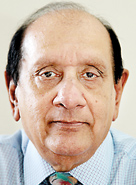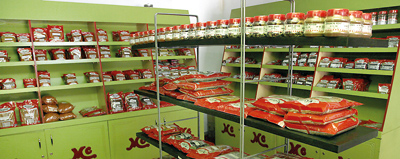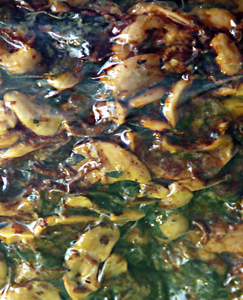Spice and all that’s nice
Fifty or sixty years ago curries were a labour of love. Spices were hunted down and painstakingly rolled till they formed a smooth paste, which a housewife would then form into a small ball. This little orb of flavoursome spices had to be used prudently over the next few days. The only hitch in the plan? Only they knew what each little spice ball contained. Woe betide anyone else who tried to make the same curry with that spice.

Nalin Pathikirikorale
Today, it’s a different story altogether. The age of grinding mills and grinding stone are long past-it’s simply a matter of popping by a shop or supermarket and picking up a packet of whatever curry mix you’ll need.
“Back in the day curries were never standardised,” says Nalin Pathikirikorale, Chairman of Lanka Spice and the Mc Currie brand, one such spice manufacturer making life easy for cooks everywhere. “You never knew what you’d get when you tasted a curry. Today it’s easier to pick similarities because most people use formulas from packets.” It’s actually a relief of sorts, he smiles. “Now you know what you’re getting!”
Lanka Spice was formed in 1984 at a time when processed spices were difficult to come by easily. In Colombo you had to make a trip to grinding mills in either Maradana or Borella, the ‘spice markets’ of Colombo. Most families-even in cities-would buy raw whole spices from the market, clean, dry and hand them over to be rolled by a grinding mill. It was a laborious process that yielded frustratingly little result, especially if you were a single household. Nalin was in London at the time when good friend and former boss Summa Navaratnam persuaded him to invest in Sri Lanka’s spice industry. Nalin will tell you that it was a massive leap of faith, because his knowledge of spices was as elementary as the next person.
Almost three decades later the Mc Currie team has earned themselves a name for quality products on the market. They started out with the traditional powdered spices-curry powder, chilli powder, cinnamon…you name it-and gradually stepped up their base to include curry pastes, sauces, baduns (fries), pickle, sambols, chutneys and assorted whole spices.

Tempting ranges: Well stocked shelves at the Maya Avenue showroom
The buck doesn’t stop there. They’ve just launched an exciting new range of ready-made masala curry bases. “With time we realised that our job was to make a cook’s life as easy as possible,” says Nalin. “We needed to upgrade the product to keep up with modern times.” The ready-made curry base is a beautifully simple product that contains everything you need to put in a curry in one handy mixture. The masala paste is designed to be used in meat and seafood-so all you have to do is boil your main ingredient with some salt, temper with your curry base, add water, cook for five minutes and voila-you’ve got a delicious curry. We’re told that this ‘hurry curry’ tastes exactly how it would had you simmered the curry for hours. Right now they’ve got a small range of six bases for meat including mutton, chicken, prawn and cuttlefish masala pastes (to be made available in stores soon).
The curry concentrate was developed by the Singapore Institute of Scientific Research. Mc Currie have their own chef who works together with their partners to develop products suited for the Sri Lankan palate, and they’ve got a sensory tasting panel that make decisions on the success of a product. The products are manufactured in their two factories in Pannipitiya and Nalanda (near Dambulla).

Using modern technology: Vacuum packed cadju badum. Pix by M.A. Pushpa Kumara
They say that being in Dambulla gives them a huge advantage in terms of sourcing their products because the company philosophy is to buy as much produce from local farmers as possible. The Nalanda factory is strategically located so that it’s close to Matale (a major local source of spices) and the Dambulla Economic Centre (where the country’s produce is famously distributed from). Whatever else they can’t get from Sri Lanka is imported. These imports include the virgin and extra virgin olive oil they import from Turkey, a new addition to their repertoire.
At the main Mc Currie showroom on Maya Avenue they also offer vacuum packaging services. The idea is to suck the air out of a special package so things like isso badun and cashew mixtures can last longer. Needless to say, the service is hugely popular with Sri Lankans living abroad and students heading off to university (we’re told that sales happen frequently online). Mc Currie also exports to selected EU countries, USA, Australia, the Middle East, Singapore and Malaysia among others.
Their passion for the spices that they produce is potent, because like any spice manufacturer they understand that Sri Lankan cuisine is defined by what goes into that curry.
Soon they’ll also open Mc Curries, a restaurant that will cater to diners looking for the perfect concoction of spices in their food. The team also runs a blog (lankaspice.wordpress.com) where they impart little titbits of spice-related wisdom and introduce their products, so keep an eye on that for more information.
comments powered by Disqus

